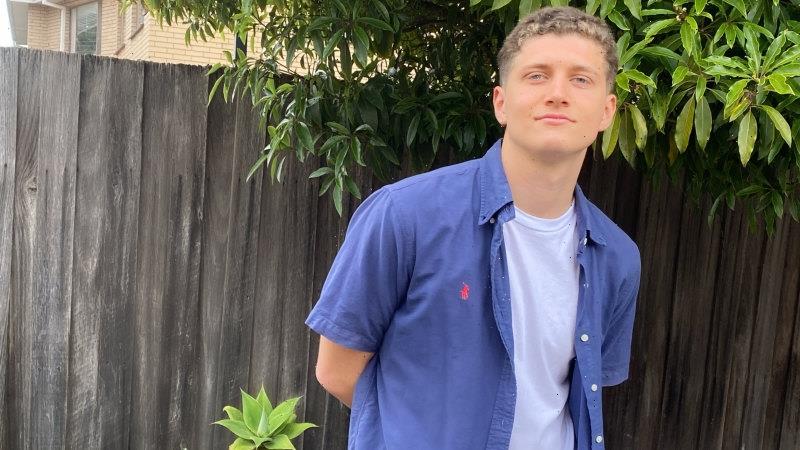For our free coronavirus pandemic coverage, learn more here.
Rewind six months and being infected with COVID-19 in Australia was taboo, an event shrouded in uncertainty and shame.
You almost certainly wouldn’t post a video on social media making light of contracting the virus as the country pursued a zero transmission strategy.
Young people aged 18 to 24 are comprising up to 40 per cent of COVID-19 cases in Victoria.Credit:Chris Hopkins
Log on to video sharing platform TikTok today, however, and you will see that catching COVID-19 has become a trend in its own right.
New South Wales surpassed 23,000 daily cases on Tuesday while in Victoria COVID-19 commander Jeroen Weimar revealed 30 to 40 per cent of infections, which exceeded 14,000, were young people aged 18 to 24. The TikTok generation.
Some on the platform have been criticised by their audiences for glamorising and downplaying the severity of COVID-19 after they posted videos showing their positive results, sometimes accompanied by vision from the music festival or event where they caught it.
Izak Volteas, 20, says he uploaded a video of his positive rapid antigen test on Sunday to tackle the stigma of becoming infected.
He spent New Year’s Eve in Sorrento, the popular Mornington Peninsula holiday spot, and by January 2 all but one member of his 10-person group had tested positive. They appear to not be alone: videos joking about the “Sorrento variant” have also begun to circulate.
In his tongue-in-cheek video, Mr Volteas lipsyncs to R’n’B artist SZA addressing the unknown person who gave him COVID-19: “If you’re wondering if I hate you … I do”.
“I did it to make this virus relatable for others my age,” he says.
“If you think about two years ago it was a bit embarrassing to get COVID, it had negative connotations. Obviously there’s so much pressure on the health system now but if we’re living with so many cases, I feel like we should be talking about it and embracing it as a population.”
Mr Volteas posted a follow-up video hours later titled “COVID symptoms they didn’t warn me about”, revealing he had slight hair loss, dry lips and felt “hungover 24/7”. He also encouraged others to share their symptoms via comments.
Izak Volteas, 20, posted a video about the coronavirus symptoms he didn’t expect.
“It’s created this healthy discussion alerting people to the effects,” he says.
The keen TikTokker and media student, who is planning another video collating his friends’ symptoms, admits he was expecting more backlash than he has received.
“I’ve read comments on other videos of people who don’t find the humour of it,” Mr Volteas says.
“They have every right to say it’s a severe virus we need to take seriously. Of course I understand the seriousness; that people have died. I saw my grandparents get really sick. But I think people cope with bad situations in different ways. There’s no right or wrong side here.”
In one coronavirus-inspired trend, young people have been uploading vision from the major music festivals or events where they caught COVID-19 while Boney M’s Rasputin plays.
“Can’t change my mind, the festival was worth it,” reads the caption on one.
Critics also weighed in: “Haha yeah people getting sick and suffering is SO funny,” is one comment.
Another format that became popular in New York City weeks ago before spreading to Australia involves people posting texts from friends who are COVID-positive. Others are more earnest, such as daily video blogs where young people detail how unwell they feel.
Digital anthropologist Crystal Abidin, from Curtin University, has studied COVID-19 on TikTok since June 2020 and says Australian users have entered the normalisation period that young people in the United States embraced in late 2020.
“TikTok is a reaction to Instagram. Whereas Instagram involves manicuring a persona, TikTok follows an ethos of strategic self-deprecation to generate attention,” says Dr Abidin.
“People commiserate with you and empathise with you rather than envy you. If you’re not a social media user, you may have the mindset that it’s inappropriately making light of a serious scenario. But that is often the coping mechanism or way of getting attention for those on TikTok.”
Some TikTok trends started among residents of New York City, where cases started booming in December.Credit:AP
Dr Abidin says young people sharing new milestones such as their first positive coronavirus test has in some cases entered the same category as graduating school or dating your first partner.
“They’re markers that characterise youth and teenhood.”
Nathan Grills, a public health expert with the University of Melbourne, views young people sharing their stories it as a useful exercise.
“Those videos show everyday behaviour like going to an event can lead to you getting the virus, coupled with the fact it can make you feel really unwell,” he says.
“After so long of barely knowing anyone who had COVID, seeing it among your friends and people your age makes it real and probably encourages you to take precaution.”
However, he believes platforms such as TikTok should attach official public health information to coronavirus-related content, as Facebook has started doing.
The Morning Edition newsletter is our guide to the day’s most important and interesting stories, analysis and insights. Sign up here.
Most Viewed in National
From our partners
Source: Read Full Article



